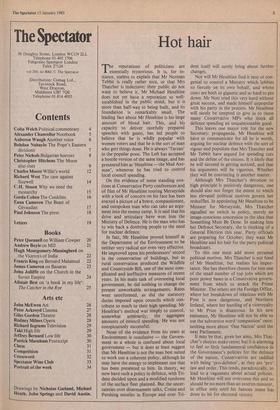Hot hair
The reputations of politicians are essentially mysterious. It is, for in- stance, useless to explain that Mr Norman Tebbit is really rather nice, or that Mrs Thatcher is indecisive: their public do not want to believe it. Mr Michael Heseltine does not yet have a reputation so well- established in the public mind, but it is more than half-way to being built, and its foundation is remarkably small. The leading fact about Mr Heseltine is his large amount of blond hair. This, and his capacity to deliver carefully prepared speeches with gusto, has led people to believe that he is wildly popular with women voters and that he is the sort of man who gets things done. He is always `Tarzan' in the popular press. The Left has accepted a hostile version of the same image, and has presented him as Heseltine — the Mad Axe- man', whenever he has tried to control local council spending.
On the evidence of some standing ova- tions at Conservative Party conferences and of film of Mr Heseltine touring Merseyside with a look of concern on his face has been erected a picture of a brave, compassionate, and outspoken man who can take an argu- ment into the enemy camp. It is said that his drive and articulacy have won him the Ministry of Defence. He is the man who has to win back a doubting people to the need for nuclear defence.
In fact, Mr Heseltine proved himself at the Department of the Environment to be neither very radical nor even very effective. He improved upon his predecessors' record in the conservation of buildings, but in rural conservation produced the Wildlife and Countryside Bill, one of the most com- plicated and ineffective measures of recent years. In his main task of overseeing local government, he did nothing to change the present unworkable arrangements. Rates went unreformed, as did the statutory duties imposed upon councils which con- tribute so much to their high spending. Mr Heseltine's method was simply to control, somewhat arbitrarily, the aggregate amounts of council spending. He was not conspicuously successful.
None of the evidence from his years at Environment is conclusive — the Govern- ment as a whole is confused about local government — but it does at least suggest that Mr Heseltine is not the man best suited to work out a coherent policy, although he may have the energy to implement one that has been presented to him. In theory, we now have such a policy in defence, with Tri- dent decided upon and a modified rundown of the surface fleet planned. But the uncer- tainties over disarmament talks, Cruise and Pershing missiles in Europe and over Tri- dent itself will surely bring about further changes.
Nor will Mr Heseltine find it easy or con- genial to control a Ministry which lobbies so fiercely on its own behalf, and whose costs are both so gigantic and so hard to pin down. Mr Nott tried this very hard without great success, and made himself unpopular with his party in the process. Mr Heseltine will surely be tempted to give in to those many Conservative MPs who think all defence spending an unquestionable good.
This leaves one major role for the new Secretary: propaganda. Mr Heseltine will have to communicate for all he is worth, arguing for nuclear defence with the sort of vigour and populism that Mrs Thatcher and Mr Tebbit have argued for spending cuts and the defeat of the unions. It is likely that he will succeed in getting noticed, and that his arguments will be vigorous. Whether they will be convincing is another matter.
Although Mrs Thatcher's devotion to high principle is positively dangerous, one should also not forget the extent to which less elevated political motives govern her reshuffles. In appointing Mr Heseltine to be Minister for Merseyside, Mrs Thatcher signalled no switch in policy, merely an image-conscious concession to the idea that Something Must Be Done. In making him her Defence Secretary, she is thinking of a General Election this year. Party officials are preparing for October; they want Mr Heseltine and his hair for the party political broadcasts.
To this one must add more personal political motives. Mrs Thatcher is not fond of Mr Heseltine, but realises his impor- tance. She has therefore chosen for him one of the small number of top jobs which are poor power bases in a Conservative govern- ment from which to attack the Prime Minister. The others are the Foreign Office, where her breakdown of relations with Mr Pym is now dangerous, and Northern Ireland, where her handing of a viceroyalty to Mr Prior is disastrous. In his new eminence, Mr Heseltine will not be able to use the subversive word 'compassion' once: nothing more about 'One Nation' until the next Parliament.
It may be that, given her aims, Mrs That- cher's choices make sense; but it is alarming to feel so little fundamental confidence in the Government's policies for the defence of the nation. Conservatives are saddled with being 'pro-defence', as they are 'pro' law and order. This tends, paradoxically, to lead to a vagueness about actual policies. Mr Heseltine will not overcome this and so should be no more than an interim minister, in office only until his famous mane has done its bit for electoral victory.






































 Previous page
Previous page